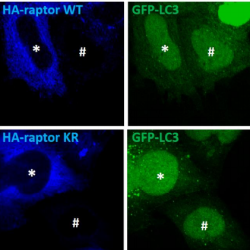
Nutrient depletion is one of several triggers of autophagy in cells. Previous work by Sung Min Son and Rubinsztein lab colleagues showed how cells respond to levels of the essential amino acid leucine through its metabolite acetyl co-enzyme A (AcCoA) and the mTORC1 complex, a master regulator of cellular growth and metabolism, and a negative regulator of autophagy. A new paper in Nature Communications extends this sensing mechanism to autophagy regulation. Under normal conditions, autophagy is suppressed through AcCoA- and EP300- dependent acetylation of raptor, which activates mTORC1. When cells are deprived of leucine, AcCoA levels decrease, thereby allowing autophagy to be activated through the converse process.

